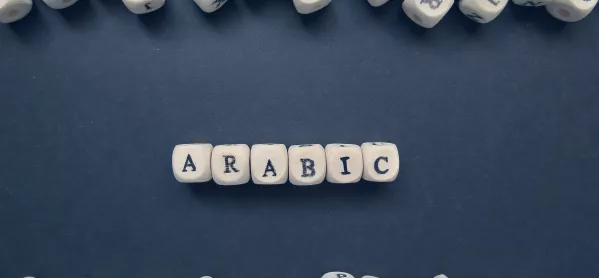- Home
- New drive to bring Arabic into Scottish schools
New drive to bring Arabic into Scottish schools

A new initiative aims to bring the teaching of Arabic into both primary and secondary schools in Scotland.
This week the Scottish primaries involved in a new programme offering an insight into Arabic language and culture will receive boxes of Arabic artefacts, such as books, scarves, musical instruments and tea sets.
Scottish schools are open but movement in and out of buildings remains restricted as a result of Covid-19. Scilt, Scotland’s National Centre for Languages, has, however, found a way to bring the wider world to pupils at a time when their ability to travel is also much reduced.
The centre, based at the University of Strathclyde, is offering an insight into Arabic language and culture in 15 primary and secondary schools around Scotland. The courses include online lessons from native-speaking teachers of Arabic in the UK and link-ups with native Arabic speakers overseas.
News: Secondaries failing to deliver the ‘right’ to languages
Languages: Steep year-on-year drop in languages entries
Related: Teachers ‘lack understanding’ of the benefits of learning languages
The centre was keen to make the experience tangible, hence the delivery of the boxes.
Scilt director Fhiona Mackay says: “It’s really important that we encourage diversity in language learning. That’s what the 1+2 approach to language learning [in Scotland] should be all about - particularly language three should be an opportunity to explore languages that otherwise children would not be exposed to. It is absolutely right that they should have the chance to experience a language that does not have the same script or alphabet as Latin or Germanic-based languages.
Introducing Arabic in Scottish schools
“We also wanted to make sure that children were getting a view of the Arabic world that was not about war, terrorism or refugees. We wanted them to see there is something quite wonderful about this ancient civilisation and help them relate that back to their own experience in Scotland.”
The courses offer learners the chance to explore the secular culture of Arabic nations and to receive a grounding in the Arabic language, which is a first language in more than 20 countries and the fifth most widely spoken in the world.
Employability skills are a major focus for secondary students, who will receive a certificate from Scilt for successful completion of the course, which runs from September to March. In the approach for primary schools, literacy skills will be developed over 10 weeks through storytelling, as pupils learn about Ibn Battuta, the renowned medieval Moroccan scholar and explorer. They will be able to explore the cultures of several Arabic-speaking countries, whilst simultaneously reflecting on Scotland’s culture.
Both the secondary and primary courses are being run in partnership with Qatar Foundation International and Scottish online-learning platform e-Sgoil.
Scilt has worked with the Scottish Refugee Council to employ and train settled refugees to work as Arabic language assistants - although coronavirus restrictions mean that, as yet, these staff cannot be deployed in schools in person.
Ms Mackay said: “Arabic is the first language for hundreds of millions of people. With many job opportunities in Arabic-speaking countries, learning the language can be a huge advantage to the students taking this course.
“Our pilot course has received a positive response and we’ve been able to teach online during periods of lockdown. It’s an exciting way of bringing the world to our young people at a time when their ability to travel has been reduced.
“We believe there are few, if any, other courses in the world teaching Arabic in this way.”
Participating schools have received grants of £2,000 to provide resources and experiences that enhance and support the language learning.
Forthcoming events in the programme include a Welcome to the Arab World webinar on Friday 20 November, which will include an introduction to Arabic language and cultures session led by UK-based Syrian journalist and refugee Zaina Erhaim, and a live performance by Syrian-American hip-hop artist Omar Offendum.
Keep reading for just £1 per month
You've reached your limit of free articles this month. Subscribe for £1 per month for three months and get:
- Unlimited access to all Tes magazine content
- Exclusive subscriber-only stories
- Award-winning email newsletters



